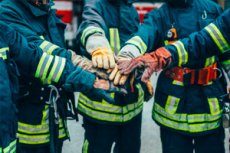New publications
Better nutrition helps firefighters fight cancer
Last reviewed: 02.07.2025

All iLive content is medically reviewed or fact checked to ensure as much factual accuracy as possible.
We have strict sourcing guidelines and only link to reputable media sites, academic research institutions and, whenever possible, medically peer reviewed studies. Note that the numbers in parentheses ([1], [2], etc.) are clickable links to these studies.
If you feel that any of our content is inaccurate, out-of-date, or otherwise questionable, please select it and press Ctrl + Enter.

Firefighters face a disproportionately high risk of developing various cancers (e.g., gastrointestinal and respiratory cancers) compared to the general population. Their experiences with cancer and their perceptions of the extent to which diet can help reduce cancer risk have been previously studied. These studies shed light on the relationship between dietary habits and awareness of cancer prevention in the firefighter community. Understanding their perceptions may help develop targeted interventions to reduce cancer risk, with an emphasis on the role of diet in cancer prevention among firefighters.
A recent article published in the Journal of Nutrition Education and Behavior examined American firefighters' understanding of the history of cancer, their attitudes toward cancer, and their views on diet as a cancer prevention measure.
Article author Ashley Brown, Ph.D., RD, TSET Center for Health Promotion Research, University of Oklahoma Stevenson Cancer Center, explained, “Given the association between diet and cancer risk, and the cancer risk among firefighters, it is critical to understand how these risk factors can be mitigated through evidence-based interventions.”
The study used a mixed-methods, cross-sectional design, recruiting participants through professional networks across the United States to recruit a national sample. The survey collected data on participants’ cancer history and their perceptions of the role of nutrition in cancer prevention, using both quantitative and qualitative questions based on existing surveys and the Health Belief Model, a health prediction tool.
Data analysis included quantitative assessment using SPSS statistical software and qualitative content analysis aimed at understanding dietary changes to reduce cancer risk. A rigorous coding process was used to identify intervention strategies and diet-related factors. Specifically, qualitative responses were coded using the Behaviour Change Techniques Taxonomy version 1 (BCTTv1) to operationalise what firefighters reported wanting to change their diet into established evidence-based behaviour change techniques to inform future interventions.
A total of 471 firefighters participated in the study. Almost half (48.4%) strongly agreed that they were at risk for developing cancer, and 44.6% agreed that changing their diet could reduce their cancer risk. The most common BCTTv1 codes were types of training, including “instruction on how to perform a behavior” (45.1%, n=189), followed by codes that focused on performing a behavior (e.g., “action planning” [24.8%, n=104]). In qualitative responses, many expressed concerns about misinformation and wanted to know exactly what level of risk reduction they could achieve by changing their diet. Many also expressed concerns about system-level barriers, such as food conditions at their fire stations.
The study suggests that beyond macro- and micro-level changes in the food environment, firefighters express a desire to receive individualized support that addresses their specific risks and helps them implement changes with the greatest potential to reduce cancer risk. The COVID-19 pandemic has heightened concerns about misinformation, including in nutrition-related areas, highlighting the need to provide accurate, specific information that can support informed dietary decisions. Future research is encouraged to consider these findings when developing interventions targeting firefighters and to explore similar strategies for other tactical populations.
Dr Brown commented: "Consistent with previous research, we found that firefighters were aware of their increased risk of cancer and were willing to change their diet to maintain their health. Although there was some concern about the impact of diet on cancer risk, most participants without a history of cancer believed that changing their diet could reduce their cancer risk."
